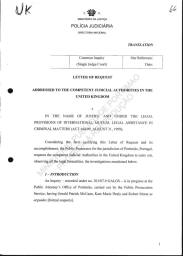Usual Challenges Faced When Performing Letters Rogatory Requests
Usual Challenges Faced When Performing Letters Rogatory Requests
Blog Article
Letters Rogatory Explained: Facilitating Legal Teamwork Between Countries

Definition of Letters Rogatory
Letters rogatory are official demands made by a court in one jurisdiction to a court in an additional territory, seeking aid in obtaining proof or testament for a legal action. This procedural system is vital in the context of international legislation, where lawful systems may differ, and cross-border collaboration is essential. Letters rogatory assist in the celebration of information that might be important for adjudicating instances, particularly in circumstances entailing intricate global concerns.
Usually, these demands occur in civil, criminal, or administrative issues where a party requires proof that is located outside the territory of the asking for court. The letters work as a means to make sure that the principles of due process are supported, enabling courts to accessibility proof that may or else continue to be hard to reach due to legal or geographical obstacles.
Using letters rogatory is governed by global treaties, reciprocal arrangements, or domestic regulations, which define the treatments and commitments of the courts included. It is necessary to note that the implementation of such requests is not assured; they depend on the laws and practices of the territory receiving the letter. Therefore, letters rogatory are an essential device for promoting lawful cooperation and making sure justice throughout borders.
The Refine of Issuing Letters Rogatory
Issuing letters rogatory involves an organized procedure that ensures conformity with both residential and global lawful criteria. At first, the requesting party, typically a court or lawful authority, composes a formal demand outlining the nature of the support looked for, the evidence or information required, and the legal basis for the request. This paper must be accurate to facilitate understanding by the foreign jurisdiction.

The next step involves sending the letters rogatory to the marked international authority. This is commonly done via polite channels or worldwide legal assistance frameworks, making certain that the demand is gotten and acknowledged by the foreign court. The international court after that processes the request according to its very own legal procedures, ultimately replying to the asking for party with the sought-after details or proof, thus promoting global legal collaboration.
Value in International Regulation
The importance of letters rogatory in international regulation can not be overemphasized, as they serve as an important mechanism for judicial participation throughout borders. These official requests for aid in lawful matters enable courts in one jurisdiction to look for information, proof, or the existence of witnesses from another territory, thereby promoting the administration of justice in global situations.
Letters rogatory are particularly vital in the context of globalization, where lawful disputes usually cover numerous countries. They make it possible for the collection of evidence that may or else be unattainable, making certain that legal process are educated and reasonable. By promoting cooperation between judicial systems, letters rogatory assistance promote the guideline of regulation and promote shared regard among nations.
Additionally, using letters rogatory demonstrates a dedication to international norms and principles of participation, reflecting the interconnected nature of contemporary lawful practices. It shows the value of sticking to recognized procedures and treaties, such review as the Hague Convention, which gives a structure for these requests - Letters rogatory. Ultimately, letters rogatory improve the efficiency of lawful processes, guaranteeing that justice is not impeded by geographical borders
Challenges and Limitations
In spite of their value, letters rogatory face several difficulties and restrictions that can hinder their performance. One key issue is the varying legal frameworks and procedures throughout jurisdictions, which can result in misconceptions and delays in the implementation of demands. Various nations might have distinct requirements for the validity of letters rogatory, complicating the process even more.
Furthermore, the usually protracted nature of international legal collaboration can hinder timely access to evidence or witnesses. This hold-up might detrimentally impact ongoing investigations or lawful proceedings, particularly in situations requiring urgent activity. The lack of resources and training in some jurisdictions can result in not enough handling of demands, leading to poor or insufficient reactions.
Cultural distinctions and differing mindsets towards lawful processes can also posture substantial obstacles. For instance, countries with much less formal lawful systems might struggle to comply with the procedural rigor anticipated in letters rogatory. Political tensions in between nations can affect the willingness to carry out requests, resulting in an absence of cooperation and reducing the utility of this system in global legislation. These obstacles necessitate constant discussion and reform to improve the efficiency of letters rogatory in lawful cooperation.
Study and Instances

Conversely, difficulties can emerge, as seen in a case including a European nation seeking evidence in a recurring criminal issue from a non-EU nation - Letters rogatory. The procedure was postponed due to administrative difficulties and differing legal requirements, inevitably preventing the investigation
These examples show that while letters rogatory can promote international teamwork and quicken lawful proceedings, they likewise highlight the requirement for clear interaction and understanding of lawful structures between countries. Such situation research studies emphasize the relevance of refining this tool to enhance efficiency and efficiency in worldwide lawful issues.
Verdict
In recap, letters rogatory serve as an important mechanism for promoting lawful participation between countries, making sure the collection of proof and testimony across jurisdictions. Their relevance in worldwide regulation can not be overemphasized, as they promote due procedure and improve the efficiency of cross-border legal procedures.
Letters rogatory are formal requests made by a court in my blog one jurisdiction to a court in an additional jurisdiction, seeking help in getting evidence or testimony for a legal proceeding. The asking for celebration, commonly a court or lawful authority, drafts a formal demand describing the nature of the help sought, the evidence or information required, and the lawful basis for the demand. The foreign court after that refines the demand according to its own lawful treatments, ultimately reacting to the requesting celebration with the in-demand info or proof, hence facilitating international lawful participation.
Moreover, the use of letters rogatory shows a commitment to international standards and principles of collaboration, mirroring the interconnected nature of contemporary lawful techniques.Worldwide legal collaboration with letters rogatory is not without its real-world effects, as illustrated by different situation studies that highlight both successes and index challenges.
Report this page